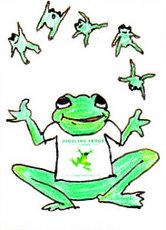I've got worms!
Don't worry. I'm not about to start revealing unpleasant personal medical information. I've started vermicomposting.
It's usually at this point, after I explain that I've voluntarily brought thousands of worms into my kitchen, that people start to back away, slowly, surreptitiously seeking the most direct path to the nearest exit.
You see, it's a bit of a stretch for a Jewish housewife to bring worms *into* the kitchen. Jewish dietary laws forbid ingesting worms, and the kosher cook is required to spend significant energy obsessing about inspecting produce for worms (and other bugs).
So I'd like to make it clear: We don't put the worms in our food. We put our food into the worms.

Adventures in Vermicomposting: Tales of the wet and squiggly.
It was a short but wiggly path to worm ownership. I'd read about it for a while and was intrigued by the idea of odorless composting indoors in the Winter; tantalized by the prospect of goof-proof fertilizer. Worm castings make excellent fertilizer that doesn't burn plants.
The "worm box" can be made almost arbitrarily small, and kept in the kitchen, basement, or an outdoor container (insulated when exposed to frost, and heated in extreme temperatures).
The only thing holding me back from full worm custodianship was that I was too cheap reticent to pay for the earthworms.
I mean, after all, we have a yard. We have a lazy and neglected compost pile. After every rainfall, earthworms sun themselves in our driveway. Pay for earthworms? You've got to be kidding! Or so I thought.
One day, about a month ago, as I sat at my computer, casually Googling "homemade vermiculture systems", I decided to start first, and figure out the particulars along the way.
From my desk, I called out to my son, who had the misfortune of being home at the time, "Jonathan! JONATHAN!!"
"Yes, Mommy?"
"Are you wearing shoes?"
"No." A sudden wariness curled the edges of his voice. After a beat, slowly and carefully, he offered, "I could put them on."
"Good. Please put on yucky shoes and go collect a bunch of earthworms from the yard."
"Huh?"
"You know, earthworms. I think 100 will be enough to start."
"But it's raining!"
"Exactly! That's the best time to collect them. They come out in the rain."
"No way. "
"What do you mean, 'no way'?! I'm your mother, and I want earthworms. Go get me some."
"Sorry."
"Didn't you hear me? I really mean it. I want you to dig up a bunch of earthworms for me. The sooner you get started, the sooner we can begin. I have a really cool project to do, and this is part of it."
"Look Mommy, it's not going to happen. I'm not going to go - out in the rain - get all wet and dirty - to dig up some disgusting worms. And I want nothing to do with any project that requires worms, or getting wet, or anything like that. "
"Look, Jonathan. You are my son, and I am your mother. The whole point of having a son, is that when you want earthworms, it's his job to go and dig them up. This is your job. "
"Nope. Not going to happen."
"Jonathan! The mother doesn't get her own earthworms. That's just not right. Please. Go. Get. Me. Some. Worms."
"Sorry. You're on your own." And with that, he retreated, barefoot and dry, to his room to do something useless and boring like study for a chemistry test.
Channeling The Little Red Hen and muttering under my breath something about "ben sorer u'moreh"*, I donned a pair of rubber gloves and set out to dig up a starter colony of earthworms.
Finding and capturing the worms was more difficult than I expected.
Our compost pile is mostly yard waste, piled high and left unturned for the eight years we've owned the house. The result is a cylinder of fantastic soil, ten feet in diameter, piled higher than me, without odors or pests. It has tons of earthworms and what I now recognized (thanks to the Internet) as worm cocoons.
The problem was, more often than not, they squiggled away from my wet grasp. The rain helped uncover them, but it also helped them escape.
Four hours later, drenched to the core and covered in mud, I declared victory and left the battlefield with my bounty: a mason jar of about fifty worms. "Discretion is the better part of valor", after all.
I tried not to dwell on how much better my son would have been at this than I was. I would have mentioned it to him, but he was hiding in his room. The coward.
I made a mesh lid for the jar using of a bit of window screen and set it, covered with a towel, on the kitchen counter. (I had read they prefer the dark.) Peeling off wet clothes , I considered burning my sneakers, then went to wash up and figure out what to do next.
Searching on-line for worm box instructions, I learned I had collected the wrong sort. The kind I had, the regular garden earthworm, is great for plants. Its castings make fine soil. But they are not appropriate for indoor vermiculture because they burrow and don't do well indoors in containers.
The type of earthworm most suitable for indoor composting is the Red Wiggler. It's a top-feeder, making the compost easy to harvest. It's also a very hungry worm, processing half its body weight every day. So, two pounds of red wigglers eat seven pounds of kitchen scraps a week.

Also, Red Wiggler worms tend to be quite happy in containers and seldom escape.
After reluctantly releasing my worms in our strawberry patch, I headed off to find a reasonable source of Red Wigglers. The pet store was less than helpful. I spent a bit of time looking for a bait shop, but it was getting late.
For some reason, the more I was thwarted in my attempts to acquire the worms, the stronger my determination became. (There's a word for this, but I'm pretending not to know what it is.)

So. Off I went to Wal-Mart. The nearest one was 20 miles away. I got there, just as the doors were closing, and ran to the back of the store. I found the small glass-fronted refrigerator in the fishing section. It was almost empty, save for three small plastic pints of worms. Unfortunately, they were Night Crawlers. Not Red Wigglers. No amount of reading and rereading the containers changed their names. I left empty handed. The clerk had to unlock the door to let me out of the store.
During the half-hour drive home, I realized that I'd spent half a day and eight dollars' worth of gas and still remained wormless. It was time to cut my losses and order the stupid worms on-line.
Before midnight, I placed an on-line order with the Worm Ladies of Charleston**, and fell asleep.
The next morning, it seemed a good idea to clean out my refrigerator in order to begin collecting kitchen scraps to feed to the worms when they arrived. This way, the scraps could begin to rot a bit in advance preparation for our guests. The worms eat the rot on the fruit or vegetable, not the fruit or vegetable itself. I wanted to get a head start so I could start feeding them as soon as possible after I got them.
Looking into my refrigerator, I noticed just how much of its contents were not food. There were the bundled asparagus roots I ordered before learning they wouldn't do well in a container. They were waiting for me to locate and dig out a sunny 20-foot plot to plant them. There was the bottle of kosher vegetable rennet, awaiting a cheese-making experiment, based on a blog post at Kosherblog. There was a chilled aluminium rolling pin, a container of home-made play dough, and a trivet covered in candle wax that was put there to make it easier to clean.
And there, all the way in the back, was a plastic bag filled with mushroom spores. I had forgotten all about the mushroom spores.
They came with the mushroom growing kit I bought a couple of months ago. The kit came with four varieties of mushroom spores: three logs that could be grown indoors (Shiitake, Oyster, and Pom Pom Blanc) and one (Morel) that required its own dedicated outdoor compost heap. The instructions said the Morel spores can be kept refrigerated until their habitat is established and ready for them.

It seemed a good day to deal with the mushroom spores. Part of why I had procrastinated about setting up the Morel Mushroom Habitat was that I was a bit spooked from reading about the horrible deaths experienced by those poisoned by eating False Morels. While the kit guarantees the safe, good, real kind of Morels, I am still a bit squeamish at the prospect of eating unbounded mushrooms popping up in unpredictable locations.
I've never had a Morel mushroom, but those I've asked who have had them, say that they really are "all that".
Figuring "if not now, when?", I set up a large container, dubbed it "Mount Morel", and filled it with the best soil from the compost heap. And, what does a compost heap need? Earthworms, of course!
And that is how, I came to spend another half day, digging up earthworms. Fourteen hours after I let their cousins free in the strawberry patch, I spent the morning under the greedy eyes of the flock of doves*** that live in our yard, harvesting the pile for worms to populate Mount Morel.






My worm delivery arrived a couple of days later. So, I'm now the happy guardian of two sets of worm colonies. We have a discreet box of happy and productive Red Wigglers in the kitchen, and another population thriving in the protected shady backyard enclave of Mount Morel.

I made more air holes to help keep the box from smelling bad. Then, (maybe a bit paranoid, but it made me feel better to do this) I duct-taped bits of window screen to the inside of the box, over every air hole. Call it the Wormy Hotel California: They can check out any time they like, but they can never leave.

The coir arrived in a compressed brick form. To set it up, I soaked it in water, strained it, and put it damp (but not leaking wet) in the bottom of the prepared worm container.







"Worms eat garbage. They make dirt. They don't have teeth, so they don't bite you. You have to hold them carefully or they will get squished. They poop and the poop makes the plants grow a lot. Some people think they're yucky or scary but we like them."
=====
* (Devarim/Deuteronomy 21:18-21)
** After some shopping around on-line, I chose them because they were nearby, reasonably priced, and enthusiastic. Plus I liked their story and their style.
*** I had to cover the box with chicken wire to keep the birds from eating all the worms in the box. I felt like Elmer Fudd, shaking my fist in the air at them, calling out "Stupid birds! Go get your own worms. These are MINE."







18 comments, so far. Add yours now!
Post a Comment
I never know what I will find on your blog.
You are a very, very brave person. This reminds me of a song that an old friend of mine used to sing. Unfortunately, she really meant it.
Nobody loves me, everybody hates me, I think I'll go and eat a worm. Gulp goes the first worm. .
oh, never mind
I like your style!
Thanks for all the details, visual and descriptive.
For the meantime we throw our organic waste material onto the neighbor's compost heap, but I, too, dream of worms. Some day....
ALN
Rotten lousy non-worm-collecting kids these days. (My husband is in solidarity with your son. Wait till he has kids of his own.)
Anyway, this sounds fabulous. Can you keep a worm colony outside, say on a deck? I have a very small kitchen, but a deck right outside the kitchen doors. Also, how do you collect the compost as it develops? I mean, do you collect it weekly from the little ecosystem somehow, or wait until you have a tub full, sort out the worms, and start again?
Wow! This is totally fascinating, despite being something I am totally and utterly not inclined to attempt ever! :) The beauty of this is that I can read all about it, and your pictures are great.
I'm glad we're both back!
I'd like to do this but I put it off in the past as the City of Vancouver used to provide the bin and worms (for a fee) but required you to take a short course (2 or 4 hours) first before they would trust you to care for these living creatures. Fine, except that all these workshops were on Shabbos! I always meant to call them and try to make some kind of exception since I obviously wasn't available then, but never got around to it.
After reading your post, I checked online and I see things have changed. No more required class, but they have only limited supplies and tell you where to find the supplies when they don't have them available.
It's probably like the black composters they sell. When they have them, you get them at a discount but they go fast. If you want them any other time you have to go directly to the supplier and pay a higher price. Their brochure is available as a pdf online and answers a lot of basic questions like how to harvest the compost, deal with smells, etc.
Now I just have to get around to actually calling the hotline about it. Hmm. Maybe this is a task for It Won't Wait Wednesday (my weekly anti-procrastination challenge).
i am rotfl at the whole story....but also impressed and weirdly jealous at your wormy-ness....
Amazing post! I don't think I would have the stomach or patience, but it's fun to follow along on your journey.
I am curious to see how it all turns out.
You are SOOO COOOL!!!
I would totally love to do the composting thing, but I am too much of a wuss.
I am in awe of you!!
I am totally curious what my son would say if I told him to start digging for worms.
My son was absolutely a little puppy in a former life -- he loves getting dirty!! (Thankfully, he doesn't argue anymore when we tell him he has to take a shower when he walks in the door!)
I had a friend who did the wormy thing, in his house. When I asked him what he was going to do with all the lovely compost he made with his worms, he told me was just going to put it in his backyard. He had no gardening plans whatsoever. Everyone's got to find their own motivation for doing stuff, I guess.
You can join our kitat konenut any time :)
If you ever want to look further into worm accessories, there's Composters. The have compost bins, worm bins, whatever.
You are a very smart person!
Hi there, I found your blog via Google while searching for first aid for a heart attack and your post looks very interesting for me.
Valuable info. Lucky me I found your site by accident, I bookmarked it.
Congratulations! It´s very good that you do this! Do you have your worm box inside your kitchen? ´cauze i think the descomposition produces a bad odor... thanks!
congratulations! do you have your worm box inside your kitchen? doesn´t it produce bad odor? thanks! i wanna make my own
Post a Comment